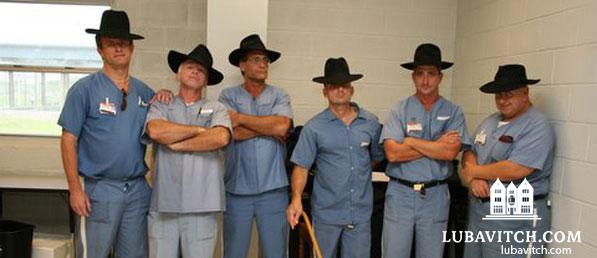(lubavitch.com) Gordon M., 36, is an inmate at a Virginia prison where he recently participated in a yeshiva program. Thethree-day intensive Torah study experience, he says, were “the happiest and most joyful days in my last ten years of incarceration.”
For the last four years, the Aleph Institute, a Florida-based prison and military outreach organization, has been offering a comprehensive three-day learning program to Jewish inmates in prisons across the country. Known as the Adel Bas Avraham Yeshiva-in-Prison program, the learning initiative was founded by Aleph’s Executive Director Rabbi Aaron Lipskar and Mr. David Colburn, and was named for Colburn’s mother.
According to Rabbi Mendy Katz, Director of Outreach Programs at Aleph, “Yeshiva-in-Prison transplants these inmates from prison to a sort of Jewish sleep away camp.” Prisoners pray together, take meals together and study together. The impetus for the program comes from the Lubavitcher Rebbe, Rabbi Menachem M. Schneerson, says Katz. “The Rebbe always stressed the importance of helping Jewish people who are in limited situations,” encouraging them to make good use of every opportunity where their freedoms are not denied.
The program’s eight-hour daily schedule includes selections from Chasidic philosophy, the Talmud, the Mishnah and other areas of Jewish thought. Developed specifically for Yeshiva-in-Prison by program director, Rabbi Yossi Stern, Yeshiva-in-Prison pairs volunteer rabbis with inmates as study partners and mentors. For some inmates, this is the first exposure to serious Jewish study.
“This can be a life changing experience for Jewish inmates,” said Rabbi Stern. “We try to do this 10-12 times a year and each time I’m reminded of its importance.” Stern said he’ll sometimes get as many as 18 inmates at the program which, according to Rabbi Katz, represents more than 90% of the prison’s Jewish population.
The most recent Yeshiva-in-Prison program took place November 23-25 at Federal Correctional Institution Petersburg, Virginia, and was staffed by eight rabbinic volunteers, ages 22-24, from the Lubavitch Yeshiva system. Volunteer Rabbi Shmuel Margolin said that he was “reminded of the importance to see each individual as a person. We try to make them feel like people again.”
Rabbi Margolin, who has been involved in prison outreach as a volunteer for the past three years, led the closing session at FCI Petersburg. “Every single person has a certain mission in life, that no one before him in history, and no one after him in the future can ever accomplish,” Rabbi Margolin said then, reinforcing the idea that each of them yet has his purpose to fulfill, despite the restricted circumstances of their lives.
“They love this,” Rabbi Katz said of the volunteers, “it’s a new and interesting experience. They value developing relationships with individuals in such a situation.” Rabbi Margolin, who has volunteered with prison outreach for the last three years, said the program gave him “a chance to really connect with individual inmates.”
Rabbi Joseph Kolakowski, the Richmond, VA based contract Jewish Chaplain at FCI Petersburg, said he appreciated the program’s work on behalf of the inmates whom he serves. The program “was very well received. Everyone enjoyed it immensely.”
Chaplain Bertrum McPhee of South Bay Correctional Facility said that “the program had a great effect on the participation of residents of the faith,” pointing to the fact that “attendance has gone up from six men to 23 men.” He echoed Rabbi Katz’s appreciation of the volunteers, who, through their work, “stirred a desire for the men to have a greater understanding of their practices.”
The program’s next session will take place December 8-10 at Miami Federal Correctional Institution. Upcoming programs are scheduled as well for prisons in Pensacola, FL and Allenwood, PA.

E WILSON
The important thing to remember about all religions is that they are manmade. Ordinary men wrote the religious guidance rules and sometimes they were written with an ulterior motive in mind, for instance, the phrase give us this day our daily bread could mean providing its Katz’s bread, share your wealth with others may mean ‘In God we trust, we will hold onto your cash for him forever. You can have great fun translating most religious messages into their actual end user meanings and discovering which are the richest churches in the world?